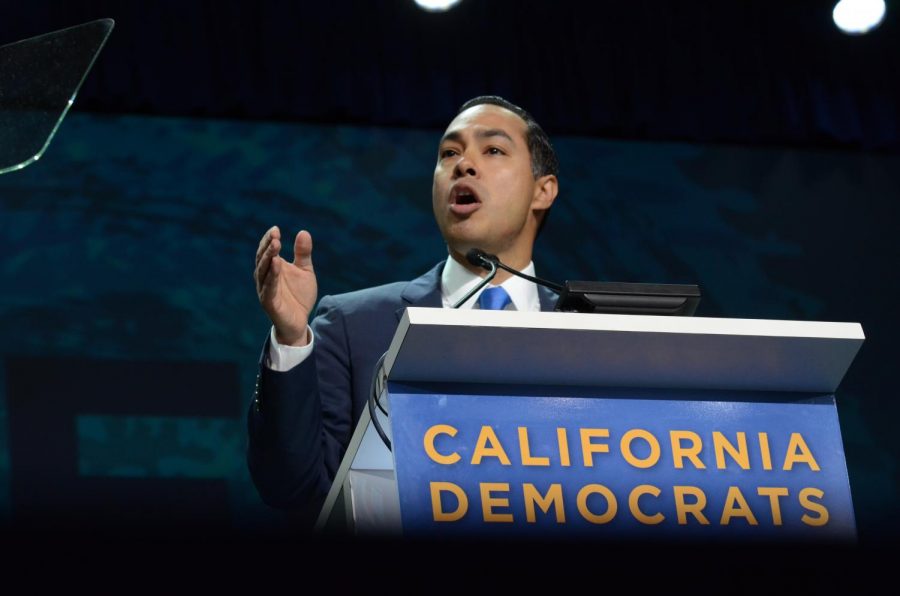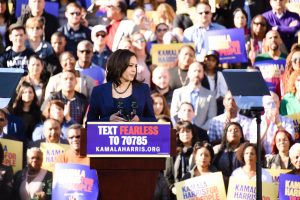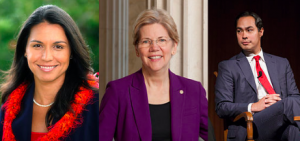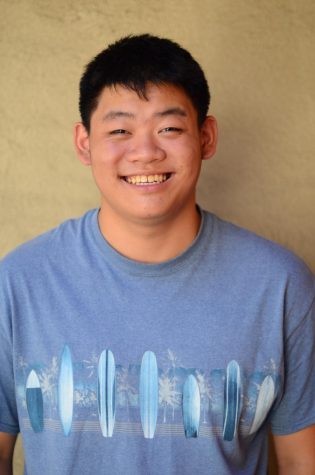After struggling for wider voter base appeal, Julián Castro ends bid for presidency
Julián Castro brings up his concerns with the current administration’s immigration policy during the California Democrats’ State Convention in June 2019. He was formerly the mayor of San Antonio, Texas, and Secretary of Housing and Urban Development.
January 7, 2020
Former Secretary of Housing and Urban Development Julián Castro, 45, ended his campaign for the presidency Thursday morning, as he announced in a nearly four-minute video on Twitter.
His message failed to resonate with a wider voter base. Between Dec. 11 and 31, Castro polled at just 1.1 percent nationally, according to RealClearPolitics.
“With only a month until the Iowa caucuses, and given the circumstances of this campaign season, I’ve determined that it simply isn’t our time,” Castro said in the video announcing his departure.
Castro has since endorsed Sen. Elizabeth Warren (D-Mass.), as he announced in a tweet yesterday morning.
“Elizabeth and I share a vision of America where everyone counts,” Castro tweeted. “I’m proud to join her in the fight for big, structural change.”
With the exit of Castro, the only Latinx candidate, there remain 14 Democratic candidates in the primary race.
Castro’s departure follows Sen. Kamala Harris’ (D-Calif.) exit from the race on Dec. 3, which Castro responded to by criticizing the dwindling diversity in the Democratic candidate pool.
“The media’s flawed formula for ‘electability’ has pushed aside women and candidates of color,” Castro tweeted that day.
Four women and four people of color remain in the race. Of the 15 candidates who have dropped out of the race so far, two are women and two are people of color.
Castro’s campaign has not yet responded to Harker Aquila’s request for a statement regarding his exit from the primary race.
Since announcing his bid for the presidency last January, Castro has participated in four Democratic primary debates but struggled to gain polling traction within the Democratic electorate, rarely receiving more than two percent of voters’ support in national polls.
Castro’s video included a montage of his visits to the U.S.-Mexico border and a homeless shelter in Oakland, highlighting his push to reform immigration and housing policy and elevate the marginalized in American society.
“We’ve shaped the conversation on so many important issues in this race, stood up for the most vulnerable people and given a voice to those who are often forgotten,” Castro said in the video.
The video also included a voiceover of Castro listing the names of people of color who have suffered police brutality, like Michael Brown, Tamir Rice, Aiyana Jones and Eric Garner. Castro’s platform emphasized ending over-aggressive policing and holding law enforcement accountable for their actions.
“I want to create a tracking system of officers who have used excessive force. The public deserves to know,” Castro said in a June 2019 interview with Harker Aquila.
Throughout his year-long campaign, Castro repeatedly spearheaded new progressive policies surrounding race and immigration as part of his “People First” platform.
In early April 2019, Castro was the first presidential candidate to release an immigration plan, which advocated for decriminalizing border crossings and reversing the Trump administration’s cuts to refugee admissions.
Castro also called for greater investment in tools to counter homelessness and displacement in places like the Bay Area, drawing on his experience as Secretary of Housing and Urban Development from 2014 to 2017 under President Barack Obama.
“We need to create more affordable housing in neighborhoods that we’ve oftentimes not invested in and then also neighborhoods of so-called higher opportunity, so that people have a choice of where to live,” Castro said in an August 2019 interview with Harker Aquila.
Castro has criticized the Democratic party’s presidential nominating process on multiple occasions and did so again in his Twitter video.
Castro did not qualify for the last two Democratic debates on Nov. 20 and Dec. 19. While he met the 165,000 and 200,000 unique donation thresholds for the November and December debates respectively, he failed to poll at four percent in four national or state surveys.
Five candidates including former vice president Joe Biden, mayor Pete Buttigieg, Sen. Amy Klobuchar, Sen. Bernie Sanders and Warren — all of whom are white — have qualified for the seventh Democratic debate on January 14.
In early November 2019, Castro generated controversy with his call to reorder the electoral voting system, claiming that white majority primary states, especially Iowa and New Hampshire, do not represent the racial demographics of the nation at large.
Castro polled at only 0.5 percent in Iowa from Nov. 6 to Dec. 16, 2019, according to statewide polls averaged by RealClearPolitics.
According to Ballotpedia’s official list of registered candidates, Democratic candidates remaining in the presidential race include nine men and four women: Sen. Michael Bennet; Biden; former New York mayor Michael Bloomberg; Sen. Cory Booker; Buttigieg; former Rep. John Delaney, Rep. Tulsi Gabbard; Klobuchar; former Massachusetts governor Deval Patrick; Sanders; businessman Tom Steyer; Warren; author Marianne Williamson; and businessman Andrew Yang.
Williamson laid off her entire campaign staff but will not be suspending her campaign, as she announced Thursday on her website.
The current Republican candidates are incumbent President Donald Trump, businessman Roque De La Fuente, former Rep. Joe Walsh (R-Ill.) and former Massachusetts governor Bill Weld.


















![“[Building nerf blasters] became this outlet of creativity for me that hasn't been matched by anything else. The process [of] making a build complete to your desire is such a painstakingly difficult process, but I've had to learn from [the skills needed from] soldering to proper painting. There's so many different options for everything, if you think about it, it exists. The best part is [that] if it doesn't exist, you can build it yourself," Ishaan Parate said.](https://harkeraquila.com/wp-content/uploads/2022/08/DSC_8149-900x604.jpg)




![“When I came into high school, I was ready to be a follower. But DECA was a game changer for me. It helped me overcome my fear of public speaking, and it's played such a major role in who I've become today. To be able to successfully lead a chapter of 150 students, an officer team and be one of the upperclassmen I once really admired is something I'm [really] proud of,” Anvitha Tummala ('21) said.](https://harkeraquila.com/wp-content/uploads/2021/07/Screen-Shot-2021-07-25-at-9.50.05-AM-900x594.png)







![“I think getting up in the morning and having a sense of purpose [is exciting]. I think without a certain amount of drive, life is kind of obsolete and mundane, and I think having that every single day is what makes each day unique and kind of makes life exciting,” Neymika Jain (12) said.](https://harkeraquila.com/wp-content/uploads/2017/06/Screen-Shot-2017-06-03-at-4.54.16-PM.png)








![“My slogan is ‘slow feet, don’t eat, and I’m hungry.’ You need to run fast to get where you are–you aren't going to get those championships if you aren't fast,” Angel Cervantes (12) said. “I want to do well in school on my tests and in track and win championships for my team. I live by that, [and] I can do that anywhere: in the classroom or on the field.”](https://harkeraquila.com/wp-content/uploads/2018/06/DSC5146-900x601.jpg)
![“[Volleyball has] taught me how to fall correctly, and another thing it taught is that you don’t have to be the best at something to be good at it. If you just hit the ball in a smart way, then it still scores points and you’re good at it. You could be a background player and still make a much bigger impact on the team than you would think,” Anya Gert (’20) said.](https://harkeraquila.com/wp-content/uploads/2020/06/AnnaGert_JinTuan_HoHPhotoEdited-600x900.jpeg)

![“I'm not nearly there yet, but [my confidence has] definitely been getting better since I was pretty shy and timid coming into Harker my freshman year. I know that there's a lot of people that are really confident in what they do, and I really admire them. Everyone's so driven and that has really pushed me to kind of try to find my own place in high school and be more confident,” Alyssa Huang (’20) said.](https://harkeraquila.com/wp-content/uploads/2020/06/AlyssaHuang_EmilyChen_HoHPhoto-900x749.jpeg)










